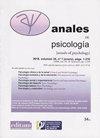Sex differences on cognitive reflection
IF 1.3
4区 心理学
Q3 PSYCHOLOGY
引用次数: 0
Abstract
The Cognitive Reflection Test or CRT is a popular measure designed to distinguish the intuitive thinking processing from the analytical one. Sex differences in the CRT have been found in multiple studies. In this research, the influence of the mathematical component on sex differences is studied by using two different instruments to measure cognitive reflection: the original CRT and one extended version of the original one, both with a high arithmetic component and, on the other hand, a set of five classic heuristic tasks, called CHT, with a lower numeracy content. The results show that these sex differences disappear when the mathematical nature of the tasks is reduced. Finally, in this work a more elaborate way of scoring the intuitive responses is addressed in relation to the meaning of these differences. La prueba de reflexión cognitiva o CRT (Cognitive Reflection Test) es una medida popular diseñada para distinguir el procesamiento del pensamiento intuitivo del analítico. Se han encontrado diferencias de sexo en el CRT en múltiples estudios. En esta investigación se estudia la influencia del componente matemático en las diferencias de sexo utilizando dos instrumentos diferentes para medir la reflexión cognitiva: el CRT original y una versión ampliada del original, ambos con un alto componente aritmético y, por otro lado, un conjunto de cinco tareas heurísticas clásicas, denominadas CHT, con un contenido numérico más bajo. Los resultados muestran que estas diferencias de sexo desaparecen cuando se reduce el carácter matemático de las tareas. Finalmente, en este trabajo se aborda una forma más elaborada de puntuar las respuestas intuitivas en relación con el significado de estas diferencias.认知反射的性别差异
认知反思测试或CRT是一种流行的测量方法,旨在区分直觉思维处理和分析思维。在多项研究中发现了CRT中的性别差异。在这项研究中,通过使用两种不同的工具来测量认知反射来研究数学成分对性别差异的影响:原始CRT和原始CRT的一个扩展版本,两者都有很高的算术成分,另一方面,有一组五个经典的启发式任务,称为CHT,数量含量较低。结果表明,当任务的数学性质减少时,这些性别差异就会消失。最后,在这项工作中,根据这些差异的含义,讨论了一种更详细的评分直觉反应的方法。认知反思测试(CRT)是一种流行的测量方法,旨在区分直觉思维和分析思维的处理。在多项研究中发现了CRT的性别差异。这项研究使用两种不同的工具来测量认知反射,研究数学成分对性别差异的影响:原始CRT和原始CRT的扩展版本,两者都具有很高的算术成分,另一方面,一组五个经典的启发式任务,称为CHT,数值含量较低。结果表明,当任务的数学特征减少时,这些性别差异就会消失。最后,本文讨论了一种更详细的方法,根据这些差异的含义对直觉反应进行评分。
本文章由计算机程序翻译,如有差异,请以英文原文为准。
求助全文
约1分钟内获得全文
求助全文
来源期刊

Anales De Psicologia
医学-心理学
CiteScore
3.30
自引率
5.90%
发文量
57
审稿时长
4-8 weeks
期刊介绍:
Anales de Psicologia / Annals of Psychology is a multidisciplinary journal of the various thematic areas of scientific psychology. It publishes original research articles and theoretical review in any of its basic, applied and methodological areas included within psychology.
Publishing, financing, marketing and distribution corresponds Editum: Editions of the University of Murcia (Spain). The organizational guidelines and editorial policies come from the Editorial Team (elected for four years by the Areas and / or Departments of Psychology at the University of Murcia) and the Editorial Board, composed of scholars and experts from different universities and institutions national and international. It is published in print (ISSN: 0212-9728) since 1984 and in Internet publishing (web) (ISSN: 1695-2294) since 2000. Available online full text in pdf from the vol. 1 1984.
Anales de Psicologia / Annals of Psychology maintains a system of exchange with other journals and publications of psychology in the world. Through an free exchange agreement with their respective publishers or entities responsible for editing, these journals and publications are received at the University of Murcia (Biblioteca "Luis Vives", near the Faculty of Psychology) and in return, our journal is sent to libraries and educational and research institutions such centers responsible for editing.
 求助内容:
求助内容: 应助结果提醒方式:
应助结果提醒方式:


